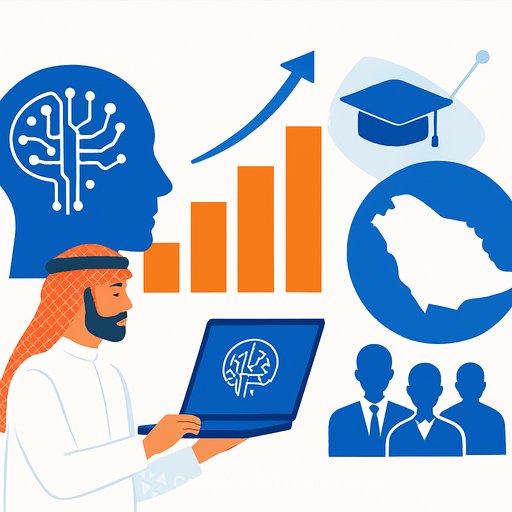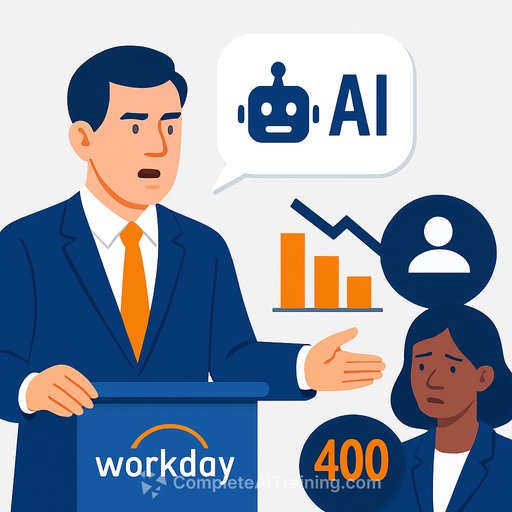Saudi Arabia's 100,000-AI Certification Push: What Executives and HR Leaders Need to Do Now
Saudi Arabia is accelerating workforce readiness in AI and data at national scale. The Ministry of Communications and Information Technology (MCIT), in partnership with Incorta, is launching a program to certify 100,000 citizens-a core move aligned with the Kingdom's broader goal to train 1 million Saudis in AI under the Saudi Data and AI Authority (SDAIA), with support from the Ministry of Education and the Ministry of Human Resources and Social Development.
The initiative will be delivered through the National eLearning Center, with additional momentum from MCIT's Mostaqbali program, which targets training for another 50,000 people. For leaders, this is a clear signal: AI capability will be built across student pipelines, the current workforce, and executive teams-on a defined timeline.
Why this matters for executives and HR
- Secure scarce talent: a national pipeline of work-ready AI and data professionals reduces hiring friction and onboarding time.
- Operational impact: certified staff can improve decision quality, automate repeatable tasks, and speed up execution across functions.
- Inclusivity as a growth lever: the program prioritizes youth and women, expanding your talent pool and leadership bench.
- Employer brand: early adoption signals capability and purpose, which helps retention and recruitment.
Program structure at a glance
- Future talent: University pilots and live industry challenges start in Q4 2025. The first official cohort launches in early 2026 with 50-75 top students and early-career professionals working on real projects from Incorta and partners. High performers can earn certifications, internships, and potential job offers.
- Workforce skills and career development: Nationwide upskilling via online certifications is underway, including Foundations of Data for AI, Champions of Data, and the AI Masterclass. Tracks scale through 2026.
- Executive readiness: Multi-day leadership programs and roundtables with partners like Gartner, Wipro, and Google begin mid-2026, giving senior leaders practical frameworks to turn AI strategies into measurable outcomes.
Key milestones and opportunities
- Q4 2025: University pilots and live industry challenges go live.
- Early 2026: First cohort (50-75). Vision 2030 Hackathons begin, focused on renewable energy optimization, trade resilience, and industrial efficiency.
- 2026-2030: 100 summer internship placements across five years at Incorta's US offices, giving Saudi students direct exposure to applied AI and data projects.
- Mid-2026: Executive programs and roundtables launch with global partners.
What program leaders are emphasizing
Incorta's CEO and co-founder Osama El-Kady highlights practical application over buzz. The focus is on preparing participants for what's ahead in AI, with real projects and data-driven decision-making embedded across ministries, government entities, and private companies.
MCIT's acting deputy minister for capabilities and future work, Safa Al-Rashed, underscores a long-term commitment to inclusive growth-certifying 100,000 individuals to build a workforce that supports sustainable economic outcomes and strengthens Saudi Arabia's AI leadership.
Incorta's CMO, Noha Rizk, frames the effort as a people-centered approach that other nations can learn from. Surveys indicate strong regional employee optimism about AI-over 80 percent in Saudi Arabia and the UAE-creating favorable conditions for adoption at scale.
Role mapping: which tracks fit which teams
- Data Literacy / Foundations of Data for AI: All functions; baseline capability for decision support and KPIs.
- Champions of Data: Domain leads in operations, finance, supply chain, and commercial teams.
- AI Masterclass: Analysts, data professionals, and builders who deliver use cases and automations.
- Executive programs: CXOs, business unit heads, directors-translate strategy to deployment, policy, risk, and ROI.
What employers should do next
- Run a skills audit: Map critical roles to the program's tracks; identify gaps by business unit.
- Nominate early adopters: Pick 5-10 percent of each function to enroll first; set quarterly targets tied to business metrics.
- Set real projects: Prepare datasets and use cases for cohorts (forecasting, quality control, customer service, fraud, or maintenance).
- Update job architecture: Add AI skills and certifications to role profiles, performance reviews, and compensation levers.
- Stand up governance: Define data access, risk, and compliance; create clear approval paths for pilots and deployment.
- Budget time, not just fees: Protect 2-4 hours per week for participants; managers should commit to reviewing project outputs.
Context for strategic planning
This initiative supports Vision 2030's economic diversification and digital capability agenda. For more on national objectives, see Vision 2030 and SDAIA.
Where to find additional training paths
If you are aligning internal capability frameworks or building a certification ladder by role, explore curated options here:
Bottom line
The Saudi AI certification program pairs national intent with execution details: pilots, cohorts, internships, and executive readiness. For leaders, the advantage goes to those who commit early, align training with business outcomes, and put real data projects in the hands of employees.
Your membership also unlocks:









